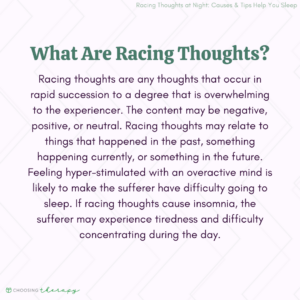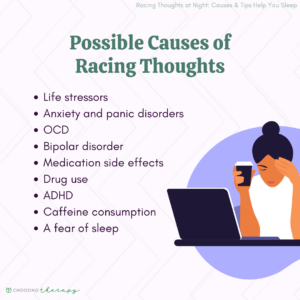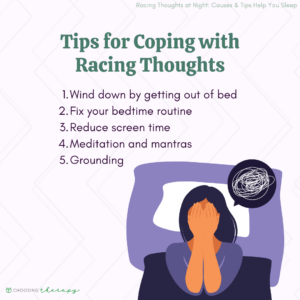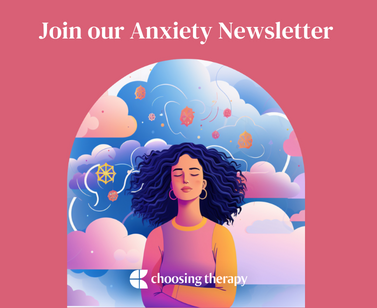Experiencing different thoughts simultaneously or one after another when trying to sleep is known as racing thoughts at night. Often a symptom of anxiety, they can be random or attributed to a particular event or stage of life. Racing thoughts may be a temporary uncomfortable experience or signal a larger behavioral health concern, but effective coping and treatment options can help you get to sleep.
Find a supportive therapist who can help with anxiety.
BetterHelp has over 20,000 licensed therapists who provide convenient and affordable online therapy. BetterHelp starts at $65 per week. Take a Free Online Assessment and get matched with the right therapist for you.
What Are Racing Thoughts?
Racing thoughts are any thoughts that occur in rapid succession to a degree that is overwhelming to the experiencer. The content may be negative, positive, or neutral. Racing thoughts may relate to things that happened in the past, something happening currently, or something in the future. Feeling hyper-stimulated with an overactive mind is likely to make the sufferer have difficulty going to sleep. If racing thoughts cause insomnia, the sufferer may experience tiredness and difficulty concentrating during the day.
Some describe racing thoughts more as a feeling of “free floating anxiety”. This is a general inability to calm down, relax, and sleep but the source of the nighttime anxiety may be hard to pinpoint. While they aren’t always negative, racing thoughts might center on a particular problem or they may start on one topic and move on to others while becoming increasingly distressing or negative.
What Does a Racing Mind At Night Feel Like?
Feeling objectively tired and ready to sleep but finding it difficult to relax and fall asleep can be a disconcerting experience.When it happens repeatedly it becomes highly distressing. During the day we are focusing on tasks and moving from one environment to another which tends to crowd out the thoughts that assault us at night. When our mind is tired and unoccupied with tasks it is more vulnerable to racing thoughts.
Sometimes the things we do to manage an overactive mind can worsen the condition. We may use caffeine to make it through the exhaustion we feel. We may use alcohol in the evening which leads to poor quality sleep. Or we may attempt to distract ourselves with digital media. These strategies lead to difficulty falling asleep and staying asleep.
Racing thoughts at night might feel like:
- Memories that come in an endless loop
- Random thoughts coming in quick succession
- Worries about your to do list
- Excitement about an upcoming event
- Evaluative thoughts about yourself or others
- Making plans for the day, even if they are beneficial and productive
- Future oriented thoughts, even about illness or death
Options For Anxiety Treatment
Talk Therapy – Get help from a licensed therapist. Betterhelp offers online therapy starting at $65 per week. Free Assessment
Psychiatry for Anxiety – Looking for anxiety treatment that prioritizes you? Talkiatry can help. Find an in-network psychiatrist you can see online. Get started with our short assessment. Visit Talkiatry
Possible Causes of Racing Thoughts at Night
Racing thoughts at night might be a benign and temporary condition that arises from a stressful situation or a life transition. Several mental health conditions also have racing thoughts as a symptom, including mood disorders, attention deficit hyperactivity disorder, anxiety disorders, and certain thought disorders. People who are experiencing mind racing at night will want to consider physical, mental and situational causes in order to address racing thoughts.
Possible causes of racing thoughts at night include:
Life Stressors
Stressors are the most common cause of racing thoughts, particularly financial stress, family stress or relationship stress. Often vocational stress and employment burnout can lead to racing thoughts. Persistent or highly acute stress caused by trauma is known as toxic stress and can present as particularly challenging and distressing racing thoughts.
Anxiety & Panic Disorders
Racing thoughts are a common symptom of anxiety. Anxiety disorders such as generalized anxiety disorder, social anxiety, PTSD, or panic disorder may cause the sufferer to experience racing and crowded thoughts. The overwhelming worries about inadequacy, forecasted negative outcomes or trauma induced memories and behaviors may be acute and disrupt falling asleep. At times the thoughts may be intense and contribute to a nocturnal panic attack.
OCD
Obsessive compulsive disorder may include crowded and racing thoughts at bedtime. Obsessions about morality, religion, contamination, making mistakes or other common OCD themes may predictably be reviewed and replayed at night. Racing thoughts may occur along with rumination and other ocd symptoms in which compulsions and rituals are created in order to manage distressing obsessions.
Bipolar Disorder
Racing thoughts are particularly prevalent in mood disorders such as bipolar disorder during periods of mania. Manic or hypomanic mood states may produce flights of ideas and sometimes high productivity but devolve into the contra-mood state known as depression or sometimes psychosis. Bipolar symptoms can also be mixed in which depressive symptoms occur alongside high energy states and uncontrolled thoughts.
Medication Side Effects
Stimulant medications may produce the side effect of racing thoughts. ADHD medications are commonly prescribed for attention deficit hyperactivity disorder and are effective at improving focus and attention. However, they are also subject to being abused in an attempt to become hyper-productive. When misused, racing thoughts may be a side effect. Evidence based approaches to ADHD treatment take into account the balance between pharmacotherapy and medication options.1
Drug Use
Substance use disorders, in particular cocaine addiction and meth addiction may evidence themselves in racing and disconnected thoughts along with other symptoms. In the short term cocaine use may result in high energy and a flurry of thoughts that make the person feel good. However, in the longer term those thoughts may tend toward paranoia. Similarly, short term methamphetamine use can produce feelings of euphoria with racing thoughts that occur alongside feelings of high energy. Later those thoughts tend toward paranoia and aggressiveness.
ADHD
Attention deficit hyperactivity disorder is a neurodevelopmental disorder in which the person experiences inattention, difficulty finishing tasks, impulsivity and high distractibility. ADHD symptoms are differentiated between people who suffer from a component of hyper-arousal and those whose primary symptom is difficulty with focus and attention. Those who suffer from hyperactive symptoms also may experience racing thoughts.
Caffeine Consumption
Caffeine use disorder may affect as many as 1 in 5 people, but is not included in the DSM-5.2 Regular caffeine use Is estimated at 80-90% of Americans with caffeine tolerance estimated at approxImately 15%. The stimulant effect of caffeine induces a similar, if milder, effect as other stimulants and may induce rapid and crowded thoughts and may be especially problematic when consumed near bedtime. Caffeine addiction will be noticed when experiencing caffeine withdrawal symptoms like headache. Controlling racing thoughts may require a review of your caffeine use.
A Fear of Sleep
Somniphobia is the term for fear of sleep. It is a specific phobia in which the sufferer fears going to sleep and which may co-occur with anxiety disorders. Distressing thoughts and sometimes panic attacks increase in frequency and severity at night. In this case the racing thoughts may be related to what might happen during sleep or having a fear of dying during the night.
5 Tips to Stop a Racing Mind When You Can’t Sleep
Reducing or eliminating the frequency and intensity of racing thoughts is possible through the development of healthy coping mechanisms and relaxation training. When there is an underlying disorder additional medical treatment can be paired with healthy changes to produce earlier and more lasting changes. Specific lifestyle changes can allow the sufferer to gain a feeling of hope and control over their distress.
Here are five tips for coping with racing thoughts at night:
1. Wind Down by Getting Out of Bed
If you have ever gone to bed worried, over stimulated with caffeine, or simply not tired, you have experienced the additional distress of tossing and turning and then worrying about your inability to fall asleep. Your bed and bedroom become mentally and emotionally paired with the inability to sleep which can contribute to the distress. At times the best response can be to get out of bed and spend 30 minutes to an hour in a wind down activity.
Examples of a wind down activity could be journaling, which can take the form of a narrative, a set of prepared journal prompts or simply writing down the thoughts occupying your mind so that you know you will not forget to take care of them. Exercise has known positive effects on mental health in particular ensuring adequate movement during the day.3 If you get up at night and feel agitated, you may want to choose calming exercises like Tai Chi or Restorative Yoga instead of an aerobic or strength training activity.
2. Fix Your Bedtime Routine
Routine is both preventative and curative when it comes to managing anxieties and racing thoughts at bedtime. Becoming dysregulated can throw off a sleep routine while re-establishing order can bring relief. Most people are familiar with the positive impact of sleep on mental health, but can have difficulty implementing changes that result in good sleep. Sometimes we can knowingly or unknowingly sabotage our own sleep, a phenomenon known as revenge bedtime procrastination.
Sometimes the most effective sleep interventions are the simplest. Start with establishing a bedtime and a 30 minute to 1 hour wind down toward that bedtime. During your wind down your goal will be to reduce stimulation from lights, screens, and activities. Make sure your sleep environment is comfortable, cool and orderly. If there are eye-sores in your bedroom, uncomfortable bedding or light from televisions and devices this may be an easy fix.
3. Reduce Screen Time
Negative associations between screen use and mental health in general have been demonstrated in numerous studies.When high screen time is linked to heavy social media use, it may be wise to take a social media break. “High screen media use was associated with a 28% increase in the odds of depression based on data from seven longitudinal and 12 cross-sectional studies.”4 Reducing total screen time is an effective way to improve mood and decreasing screen use before bed may improve thought activation that prevents sleep. Screen time has both direct and indirect effects on your brain but is a demonstrated stressor. Plan for at least one hour of screen-free time prior to bed.
4. Practice Meditation & Mantras
Meditation, mindfulness, and mantras for anxiety are associated with an increased ability to have a calm, stable mind. These strategies involve a focus on the senses, and are also skills in which the more they are practiced the greater the improvement is likely to be. Resources for learning these skills abound in the form of books, podcasts, applications, community meditation centers, and YouTube videos. For novices, starting with a bedtime guided meditation on YouTube is a low barrier way to build skills.
Mantras are a sound, word or phrase that has meaning for you and when repeated with appropriate attention and mindful breathing have a calming and centering effect.Often mantras center on peace, tranquility, or joy. Begin with three slow and steady breaths in through the nose and out through the mouth, breathing deep into the diaphragm. Mantras that induce sleep may sound like: “With every breath, I welcome sleep”, “My work for today is complete”, “WIihin me there is nothing but stillness”. Find one that feels right for you.
5. Use Grounding Techniques
The experience of racing thoughts is often described by people as being “in their head”, essentially a loss of focus with the here and now. In these moments it can be challenging to calm down. Try getting out of bed and using grounding techniques such as making a cup of herbal tea and concentrating on the feel of the cup in your hand, the warmth of the tea, and the aroma. Spray an essential oil pillow spray with lavender, chamomile, and other calming ingredients and inhale while noting the softness of your sheets, and the sound of your breath.
Would you like to have less anxiety?
Anxiety is treatable with therapy. BetterHelp has over 20,000 licensed therapists who provide convenient and affordable online therapy. BetterHelp starts at $65 per week. Take a Free Online Assessment and get matched with the right therapist for you.
Treatment Options for Racing Thoughts At Night
When the experience of racing thoughts becomes frequent, chronic or begins affecting your ability to wake up for or concentrate on work, or is distressing to the point of reducing your overall quality of life, you might wonder “do I need therapy?” If you have implemented coping skills without improvement within a few weeks, a professional may bring more effective relief.
Professional treatment options vary depending upon the diagnosis and severity of the symptoms, ranging from therapy to medication. It is helpful to start with a physical to rule out physical health disorders that are known sleep disruptors. If there is a serious mood disorder, obsessive compulsive disorder, endocrine or hormonal issues, medication may also be indicated. Many people are concerned about medication side effects and prefer the least intervention possible.
Therapy
Therapy can help manage racing thoughts by providing a holistic assessment of precursors, stressors to be addressed, and any emotional disorders contributing to racing thoughts. When the source of the racing thoughts is relational or vocationally focused, therapy may be focused in these areas. There are evidence-based approaches to the mood disorders, adhd, anxiety and obsessive compulsive disorders that may be implicated in racing thoughts. Using online therapy options can help screen for substance use disorders and either treat or make recommendations for treatment.
You may find the right therapist in an online therapist directory, through a referral from your primary care physician, or employee assistance program at work. The benefits of therapy are in having an objective assessment, an expert in teaching coping skills, support and often reparative emotional experiences for anxieties or past traumas.
Common therapy options for racing thoughts include:
- Cognitive behavioral therapy (CBT): Cognitive behavioral therapy is an evidence based approach for depression and anxiety. The approach helps people become aware of how our thoughts influence feelings and develop more skillful ways to manage them. CBT for insomnia is an approach that specifically targets sleep issues by examining how anxious thoughts play a part in insomnia.
- Mindfulness Based CBT: Mindfulness based CBT helps people develop the ability to use meditation, breathing and awareness along with cbt tools to improve behaviors and emotional responses to stressful thoughts.
- Psychodynamic Therapy: Psychodynamic therapy examines how early experiences build flawed approaches to life, both conscious and unconscious. Learning what underlies what influences the content of our racing thoughts brings the opportunity to heal and reframe those thoughts.
Medications
Medications may be helpful in treating racing thoughts. Anxiolytics, antidepressants, and stimulants for ADHD can relieve symptoms for some people, depending on the underlying cause. Medication for anxiety, medication for depression, and medication for ADHD could be considered depending upon the results of a psychosocial assessment. If there is an underlying thyroid or hormonal cause, hormone replacement therapy may be indicated.
Here are medication treatment options for racing thoughts:
- Antidepressants: SSRIs may be recommended for people who have depression. Antidepressants make you feel more optimistic, less sad and more able to take action in your life.
- Anti-Anxiety: Benzodiazepines are one category of anxiolytics. For people with anxiety disorders, anxiety medication can make you feel less worried, more energetic and improve your mood.
- ADHD Medications: Stimulant medications like Adderall can improve the focus of sufferers of ADHD and reduce racing thoughts.
- Sleep aids: Sleep aids may be prescribed or there are over the counter options. Working with a physician is recommended as some categories of sleep medications can be habit forming.
Final Thoughts
Racing thoughts at night are difficult to deal with, even more so when our sleep is impacted. There are effective ways to cope and possible treatment options. If some independent coping efforts are not effective, a physical and psychosocial assessment are the next steps to take. These can be done before or along with getting some therapeutic support to learn how to stop racing thoughts at night.
Additional Resources
To help our readers take the next step in their mental health journey, Choosing Therapy has partnered with leaders in mental health and wellness. Choosing Therapy is compensated for marketing by the companies included below.
Talk Therapy
Online-Therapy.com – Get support and guidance from a licensed therapist. Online-Therapy.com provides 45 minutes weekly video sessions and unlimited text messaging with your therapist for only $64/week. Get Started
Virtual Psychiatry
Hims / Hers If you’re living with anxiety or depression, finding the right medication match may make all the difference. Connect with a licensed healthcare provider in just 12 – 48 hours. Explore FDA-approved treatment options and get free shipping, if prescribed. No insurance required. Get Started
Anxiety Newsletter
A free newsletter from Choosing Therapy for those impacted by anxiety. Get helpful tips and the latest information. Sign Up
Learn Mindfulness, Meditation, & Relaxation Techniques
Mindfulness.com – Change your life by practicing mindfulness. In a few minutes a day, you can start developing mindfulness and meditation skills. Free Trial
Choosing Therapy Directory
You can search for therapists by specialty, experience, insurance, or price, and location. Find a therapist today.
Online Anxiety Test A few questions from Talkiatry can help you understand your symptoms and give you a recommendation for what to do next. How Does ERP Help With Intrusive Thoughts? Obsessive compulsive disorder (OCD) is a psychiatric condition marked by the presence of obsessive thoughts, images, doubts, or urges, followed by compulsive behaviors or acts aimed at easing the distress caused by the obsession. While the content of the obsessions can take many forms, they are always repetitive, persistent, involuntary, and intrusive, and they often result in a great deal of anxiety for the person experiencing them.









